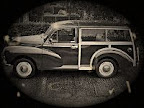Ammeter 60 - 60 or 30 - 30?
Forum rules
By using this site, you agree to our rules. Please see: Terms of Use
By using this site, you agree to our rules. Please see: Terms of Use
-
Axolotl
- Minor Fan
- Posts: 357
- Joined: Thu Apr 20, 2006 11:14 am
- Location: Burghfield Common
- MMOC Member: No
Ammeter 60 - 60 or 30 - 30?
I have a 60 -60 A ammeter fitted, and it is exceptionally useless in showing me what is actually going on because the needle deflections are so small.
I know that conventional wisdom suggests that with an alternator charged system, I should fit a 60 - 60 A range ammeter, but why?
At normal charge and usage rates which stay well below 10A, the deflection on a 60 - 60 A scale is tiny, meaning that you can't really use it for much more than a vague indication that you are charging or discharging the battery.
The same charge or discharge rate on a 30 - 30 A range would at least have a bigger needle deflection at low rates and show some meaningful difference between small currents.
With an alternator rated at 45A, and a fuse system with a maximum 35A fuse, I would never expect to exceed the range of a 30 - 30 A meter in normal use. I would also expect the gauge to have some degree of overload capacity built-in.
What is really needed is an ammeter with a log scale, that has large deflections at low currents, but the capacity to accomodate very high high currents in extremis. Does such a thing exist?
Any thoughts? If I swap my 60 - 60 A for a 30 - 30 A, would I just be fitting an expensive fuse?
I know that conventional wisdom suggests that with an alternator charged system, I should fit a 60 - 60 A range ammeter, but why?
At normal charge and usage rates which stay well below 10A, the deflection on a 60 - 60 A scale is tiny, meaning that you can't really use it for much more than a vague indication that you are charging or discharging the battery.
The same charge or discharge rate on a 30 - 30 A range would at least have a bigger needle deflection at low rates and show some meaningful difference between small currents.
With an alternator rated at 45A, and a fuse system with a maximum 35A fuse, I would never expect to exceed the range of a 30 - 30 A meter in normal use. I would also expect the gauge to have some degree of overload capacity built-in.
What is really needed is an ammeter with a log scale, that has large deflections at low currents, but the capacity to accomodate very high high currents in extremis. Does such a thing exist?
Any thoughts? If I swap my 60 - 60 A for a 30 - 30 A, would I just be fitting an expensive fuse?
Cheers, Axolotl.

I know that you believe you understand what you think I wrote, but I am not sure you realize that what you read is not what I meant.
I know that you believe you understand what you think I wrote, but I am not sure you realize that what you read is not what I meant.
-
minor_hickup
- Minor Legend
- Posts: 1101
- Joined: Wed Apr 20, 2005 8:27 pm
- Location: East Sussex
- MMOC Member: No
-
alex_holden
- Minor Legend
- Posts: 3798
- Joined: Tue Jul 25, 2006 9:46 am
- Location: Burnley
- MMOC Member: No
A 30-0-30 meter will probably be fine (I plan to fit one to my own car). I can't remember ever having seen a car ammeter with a log scale. Note that an ordinary car battery is unlikely to ever take a 30 amp charge current unless it's faulty (internal short), and you should be able to work out with your current meter if you get anywhere near a 30A discharge current with the engine off and all accessories turned on.


Alex Holden - http://www.alexholden.net/
If it doesn't work, you're not hitting it with a big enough hammer.
-
Axolotl
- Minor Fan
- Posts: 357
- Joined: Thu Apr 20, 2006 11:14 am
- Location: Burghfield Common
- MMOC Member: No
Max discharge
It looks like it never goes beyond about -10 A with everything on and the engine off. (Lights, heater blower, heated rear windows, wipers, reversing light).you should be able to work out with your current meter if you get anywhere near a 30A discharge current with the engine off and all accessories turned on
Although thinking about it, that could indicate that my present meter is reading low, as there's about 180 - 200 watts there, and from my school physics, w = v * A, so that should be about - 15A, not -10. But like I say, the scale is so big with -60 - 60, that -10 and -15 don't look much different.
Glad to read that people have 30 -30 meters fitted with no problem. I think I'll swap.
-
Welung666
- Minor Legend
- Posts: 1354
- Joined: Fri Sep 24, 2004 7:06 am
- Location: West Midlands
- MMOC Member: No
I have a 30-0-30 in Phoebe (not that I find it any use), I'd prefer a temp gauge tbh! It shows discharge when I drive home from work in the dark and rain (about -15) and charge when I have no lights/wipers/heater on (+10). If your after a 30-0-30, you can have this one as I'm fitting a temp gauge in a couple of weeks.
-
Axolotl
- Minor Fan
- Posts: 357
- Joined: Thu Apr 20, 2006 11:14 am
- Location: Burghfield Common
- MMOC Member: No
Lee,
thanks for the offer, but I already have a new one on its way.
If yours is showing a discharge while you are driving, I'd suspect something is wrong, either with the way the ammeter is wired in, or with your charging system.
Does the ignition warning light glow red too when the ammeter is showing a discharge?
thanks for the offer, but I already have a new one on its way.
If yours is showing a discharge while you are driving, I'd suspect something is wrong, either with the way the ammeter is wired in, or with your charging system.
Does the ignition warning light glow red too when the ammeter is showing a discharge?
Cheers, Axolotl.

I know that you believe you understand what you think I wrote, but I am not sure you realize that what you read is not what I meant.
I know that you believe you understand what you think I wrote, but I am not sure you realize that what you read is not what I meant.
-
Axolotl
- Minor Fan
- Posts: 357
- Joined: Thu Apr 20, 2006 11:14 am
- Location: Burghfield Common
- MMOC Member: No
I've now fitted the 30 - 30 ammeter, and it works beautifully.
The scale is now such that I can see definite differences when i turn things on and off, and the charge starts high (about 8 A) and drops off to almost zero after a minute or so (nice new fully charged battery).
Anyone want a secondhand 60 - 60 ammeter?
The scale is now such that I can see definite differences when i turn things on and off, and the charge starts high (about 8 A) and drops off to almost zero after a minute or so (nice new fully charged battery).
Anyone want a secondhand 60 - 60 ammeter?
Cheers, Axolotl.

I know that you believe you understand what you think I wrote, but I am not sure you realize that what you read is not what I meant.
I know that you believe you understand what you think I wrote, but I am not sure you realize that what you read is not what I meant.
Aye 30-30 is the one to use. The car that's showing discharge in the wet/dark - something is dfinitely wrong - first step - check the fan belt is tight enough. I bet the wipers are quite slow too! What's happening is your are discharging the battery at night - then charging it back up in daylight with the + 10 charge - the battery will fail in about 3 months like that! At decent revs the dynamo should balance the headlights + wipers + heater.


